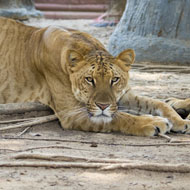US petition to stop ‘frankencat’ breeding

Ligers are the result of breeding a male lion with a female tiger.
A petition has been delivered to the US Department of Agriculture (USDA) calling for action to stop the breeding of so-called ‘frankencats’, or tiger-lion hybrids.
A coalition of US animal welfare groups is campaigning against the practice of breeding white tigers, ligers, tigons and liligers, which often suffer from debilitating health problems and shortened lifespans.
Ligers are the result of breeding a male lion with a female tiger and, as they are usually larger than both parents, many are delivered by Caesarian section. Ligers often suffer from neurological defects, sterility, cancer, arthritis and diminished lifespan.
Some are then further bred to create ‘liligers’, which are a cross between a male lion and a ligress.
Tigons, meanwhile, are the result of breeding male tigers with female lions. For those that survive infancy, there is a greater risk of various neurological and physical conditions.
Lions and tigers do not exist in the same areas in the wild and so would not naturally breed, but some exhibitors deliberately breed them in captivity.
Similarly, white tigers are created by breeding two Bengal tigers with the same recessive gene. They are reported to have neonatal mortality rates or more than 80 per cent and face significant risk of facial deformities, impaired depth perception, retinal degeneration, abnormal cranial structure, cataracts, cleft palates, mental impairment, kidney problems, cardiac defects, Parkinson’s disease, scoliosis and other spinal problems.
US groups campaigning against the breeding of these animals include The Global Federation of Animal Sanctuaries, The Wildcat Sanctuary, Big Cat Rescue, Keepers of the Wild, Lions, Tigers and Bears, the Animal Legal Defence Fund, Performing Animal Welfare Society and Peta.
Together they are calling on the USDA to ‘take proactive steps to curtail the practice by some licensees who purposefully breed tigers and other big cats for deleterious mutations and to create interspecies hybrids’.



 The BSAVA has opened submissions for the BSAVA Clinical Research Abstracts 2026.
The BSAVA has opened submissions for the BSAVA Clinical Research Abstracts 2026.